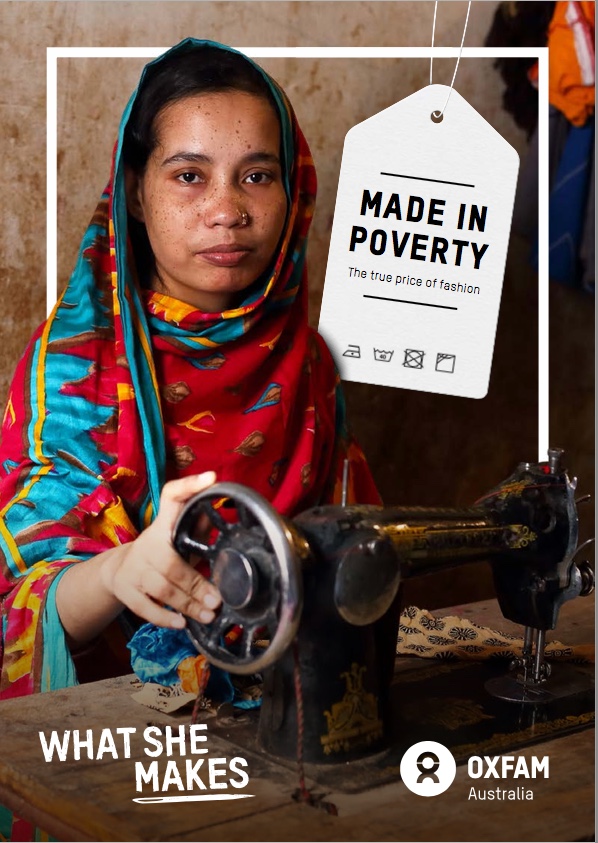An Oxfam investigation has found widespread payment of “poverty wages” among garment industry workers in Bangladesh with nine out of 10 workers interviewed there saying they were forced to regularly skip meals and eat inadequately or go into debt as a result.
The research, presented in a report, Made in Poverty, released in Australia on Monday, involved interviews with some 384 workers in Bangladesh and 88 in Vietnam between April and July last year who were all employed in factories supplying clothing to Australian brands such as Big W, Kmart, Target and Cotton On.

Cover of the Made in Poverty report.
It found that virtually all of those workers interviewed in both countries were not earning a “living wage” – defined as the lowest wage needed to cover essential basics such as having enough nutritious food, decent housing, healthcare, utilities and education. In Bangladesh nine out of 10 said they felt their income was not sufficient or only particlaly sufficient to meet their needs while in Vietnam, seven out of 10 said the same.
The findings also revealed that 72 per cent of workers in Bangladesh factories and 53 per cent of those working in Vietnam said they could not afford medical treatment when they got sick or injured, and that that more than three quarters of the Bangladesh-based workers had no running water inside their home while more than 40 per cent of workers in Vietnam reported worrying about having to use a well or rain water.
Workers in both countries reported facing significant levels of verbal abuse while those in Bangladesh also reported high levels of physical and sexual abuse. In Bangladesh, one in three of interviewed workers were separated from their children with 80 per cent of those cases reportedly the result of inadequate income.
Dr Helen Szoke, Oxfam Australia’s chief executive, said the investigation had “uncovered the widespread payment of poverty wages and the impact this is having on the lives of the workers, mainly women, making the clothes Australians love to wear”.
“Women who are unable to get treatment when they fall sick, workers who cannot afford to send their children to school, families that cannot make their pay stretch to put enough food on the table, people sleeping on floors in overcrowded houses, spiralling debts, mothers separated from their children – these are just some of the common realities of the failure of big brands to ensure the payment of living wages.”
Szoke said that with the Australian fashion industry worth $23 billion a year, “brands are responsible for making credible commitments to ensure the payment of living wages to the workers making their clothes, with clear timelines for achieving this”.
The report follows an earlier Oxfam report, What She Makes, released in October, 2017, which found paying workers a living wage would add, on average, just one per cent to the retail price of clothing.
Oxfam congratulated Cotton On last week after the company promised to develop a five year roadmap to achieve living wages for women who make its clothes. According to Oxfam’s ‘company tracker‘, Kmart and Target have also made commitments to improve how they source clothing from countries like Bangladesh and Vietnam.






